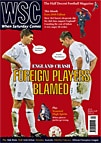 Robbie Meredith highlights the case of Darron Gibson, who has started a storm by choosing to play for the Republic of Ireland despite being born in the North
Robbie Meredith highlights the case of Darron Gibson, who has started a storm by choosing to play for the Republic of Ireland despite being born in the North
The Republic of Ireland’s 4-0 friendly win against Denmark at the end of August was the last of the few convincing performances during Steve Staunton’s ill-fated spell as manager. Two months later Staunton was sacked, but that ultimately inconsequential match in Aarhus may have lasting implications for Irish football.
At half-time a powerfully built young Manchester United midfielder named Darron Gibson came on as substitute to win his first cap for the Republic. By doing so, he sparked a dispute between the Irish Football Association and the Football Association of Ireland, and a political row that has so far dragged in all the parties in Northern Ireland’s fledgling government, the Republic’s foreign minister and FIFA.
Gibson was born in the Northern Irish city of Londonderry, a place also called Derry by a substantial number of people who reject the British identity implicit in the longer name. He was a child during the Republic’s “Big Jack” glory years of the early 1990s, an especially arid period for the Northern Ireland team. While Gibson hasn’t made any public comment about his background, it’s a fair bet that, like most youngsters growing up in nationalist areas of Northern Ireland at that time, he supported the Republic rather than his “home” country. It’s still the case that a substantial number of supporters make the trek from the North to Dublin for a big game, an affiliation that is both sporting and political, even if the relationship between the two states on the island is now much less fractious under the new political dispensation here.
Gibson was capped by Northern Ireland at Under-16 level, but then decided that he would rather play for the Republic. Coincidentally, his decision to do so was enabled by a previous attempt to find a political settlement in Northern Ireland – the Good Friday Agreement of 1998, which stated that people here could identify themselves as British or Irish. Although neither he nor a parent or a grandparent was born in the Republic, Gibson held an Irish passport and was simply exercising his rights as a citizen, but that’s not how the IFA, which governs football in the North, see it.
Keen to stop more young players following Gibson, the IFA asked FIFA to clarify their eligibility criteria. Meanwhile, the player, by now on loan at Wolves, made his competitive debut for the Republic against Slovakia in early September, while the country’s foreign minister, Dermot Ahern, met the FAI to discuss the case.
FIFA have long adopted pragmatic eligibility arrangements in disputed territories across the world, such as parts of Israel for instance, but had tightened these in 2004 in response to an attempt by Qatar to naturalise a number of Brazilians to enable them to play for the Qatari national team. As Gibson had played at under-age level for the Republic in 2003, the IFA became resigned to letting him go, but believed that they had received assurances from FIFA that he was a special case and that no other players from the North could declare for the Republic without relatives born in the southern state.
Early in November, FIFA’s legal committee ruled that this was not the case, and that players born anywhere on the island of Ireland could choose which country to play for. As it’s highly unlikely that promising kids from Cork or Dublin are bursting to make Windsor Park their home international stadium, the North are the losers in this dispute. The IFA’s chief executive, Howard Wells, pronounced himself “staggered” by the decision and promised to seek further legal advice before it was ratified by FIFA’s executive committee.
Reaction elsewhere went as you would expect. The Democratic Unionist MP Gregory Campbell accused FIFA of granting the FAI the right to “poach” players from Northern Ireland, while Sinn Fein politician Paul Butler took a predictably contrary view, welcoming FIFA’s protection for “young Irish citizens in the North whose dream it is to represent their country at international level”.
The IFA’s shock at FIFA’s decision is understandable. Northern Ireland has a population roughly the size of Birmingham. Though in the past they’ve used FIFA’s fudged criteria to select players such as goalkeeper Maik Taylor, who had no familial connection to the country but held a British passport, they cannot afford to lose a host of potential internationals born within their borders. Yet young Northern players who decide to follow in Gibson’s footsteps would be blameless, merely exercising their rights as citizens of both states to play for the country of their choice.
FIFA’s executive committee are due to make a final ruling in the new year, but it’s rare that they go against their own legal experts. Already, some people are asking why, if everyone born on the island can play for either country, there shouldn’t be just one all-Ireland team? But that, at least, is likely to remain beyond the pale for now.
From WSC 251 January 2008